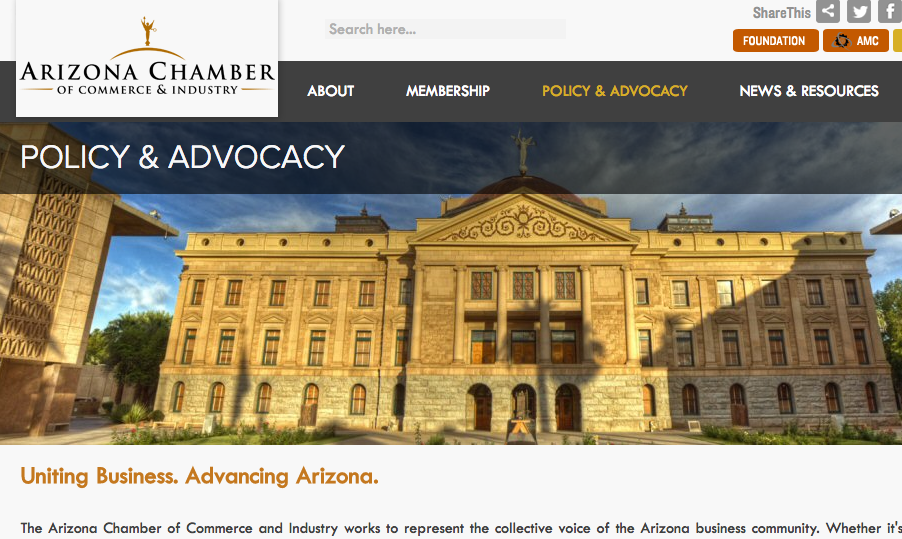PHOENIX — Three weeks before Arizonans start voting, a statewide business group has launched a campaign to kill Proposition 206.
Glenn Hamer, president of the Arizona Chamber of Commerce and Industry, acknowledged Monday it will take a “seven-digit” investment to convince voters to reject the proposal, which would increase the state’s minimum wage immediately to $10 an hour and by 2020 to $12 an hour. The same measure would require businesses to provide at least three days of paid leave a year.
“We’re going to raise as much as we can,” Hamer said, declining to specify a dollar figure.
His organization is starting not only late but also from behind: A recent poll showed the measure with a 2-1 margin of support. And early voting starts Oct. 12.
“I’ll be the first to say this is an uphill climb,” Hamer said. When voters elsewhere have been presented with similar questions, he noted, “the passing rates are high.” But Hamer said there’s still time to change some minds.
A decade ago, Arizona voters approved a minimum wage of $6.75 an hour. At the time Arizona employers were subject only to federal laws and the $5.15-an-hour U.S. mandate. The measure approved then contains an automatic cost-of-living adjustment clause, which has put the current minimum wage at $8.05; in January, that will go to $8.15.
Businesses didn’t run much of a campaign against the 2006 measure — a mistake, Hamer said, they won’t repeat this time.
The key, he said, is recrafting how voters see the issue.
On the ballot, voters will see the title of “The Fair Wages and Healthy Families Act.” “We prefer to call it “The Opportunity Destruction Act,” said Hamer.
“Jacking up the minimum wage in this state by 50 percent is dramatic,” he said. “And adding in a paid time off component is also, in our view, harmful to job creation.”
Pollster Earl de Berge of the Phoenix-based Behavior Research Center, who did not conduct the earlier survey, said the poll results are not surprising. He said there is “widespread awareness that (the) minimum wage is pathetic in today’s economy.”
Hamer is not necessarily disputing that. What he hopes will dissuade voters is the size of the increase. “We believe the proponents of this have overshot,” he said. “Going up 50 percent, going to $12 an hour, particularly in rural Arizona, is way too much.”
So, then, what does his organization think might be appropriate? “Well, the discussion on the federal level until recently has been $10.10,” Hamer said.
“That’s a number that President Obama has used,” he said, referring to the president’s 2015 State of the Union address urging Congress to adopt that number. “People like Mitt Romney have used similar figures,” Hamer added.
Since then, however, Democrats have become more aggressive, pushing for a $15 figure. Hamer blamed that on a “bidding war” among candidates.
The business community never offered a $10.10 alternative here. About the closest it came was a proposal earlier this year by the Arizona Restaurant Association to ask voters to instead set the minimum wage at $8.41 an hour this coming year, going to $9.50 by 2020. The measure cleared the state Senate with Republican support but died in the House.
Proponents of Proposition 206 had raised more than $1.4 million as of mid-August, the most recent campaign finance report available. But $900,000 of that went to hire paid circulators. With other expenses, that report showed the committee had about $127,000 on hand.
No matter how much each side spends, de Berge said it may not be enough.
“Even a million dollars may get lost in the candidate combat that is expected this year in Arizona,” he said, with not just the presidential race but also a high-profile contest for the U.S. Senate and some hot-button congressional races.
That has not escaped Bill Scheel, campaign manager for Proposition 206.
“It definitely takes millions of dollars to break through that din,” he said. Scheel declined to say how much is in the pro-206 budget but said he expects to have enough to conduct a full-scale campaign including television, newspaper and direct mail ads.





